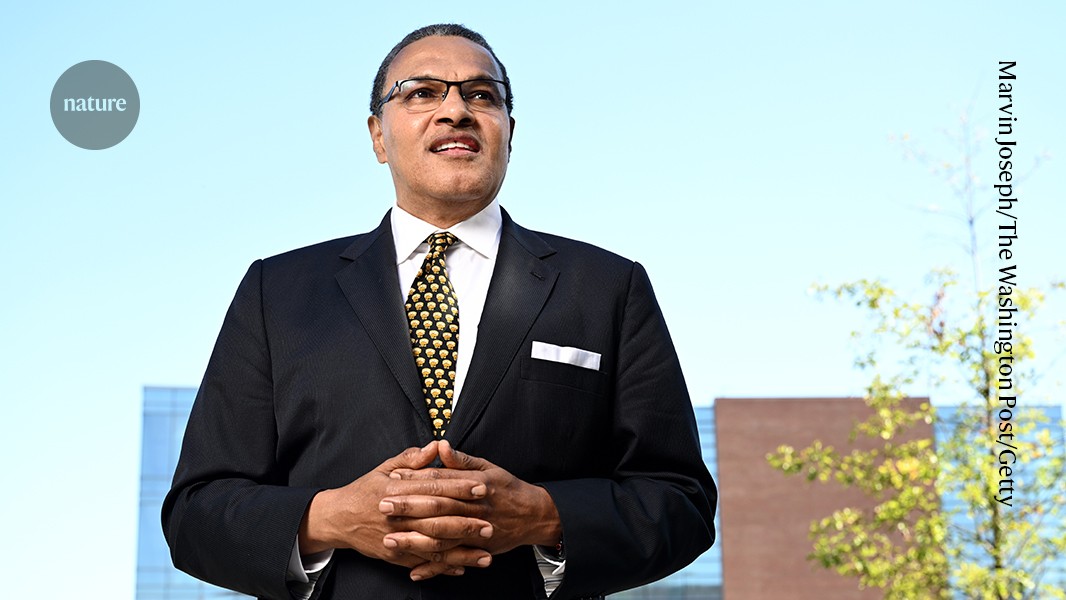Changemakers — Nature’s new series celebrates champions of inclusion in science Our series will tell their stories and highlight their achievements

All around the world, people are pushing back against racism, gender bias and other forms of discrimination to make a positive difference

Freeman Hrabowski is the first of Nature’s Changemakers.Credit: Marvin Joseph/The Washington Post/Getty
In October 2022, Nature published a special issue on the urgent need to tackle racism in science (see go.nature.com/3uxidgb). The journal has returned to the topic repeatedly in response to racism’s continuing and pervasive effect on many scientists’ working lives.
This week sees the launch of a new — and new kind of — series of articles. ‘Changemakers’ will appear in Nature’s Careers section, periodically featuring researchers who have championed and led initiatives aimed at dismantling systemic racism, gender bias and other forms of discrimination in science. Researchers will describe their experiences in their own words, which we will publish in an edited Q&A format.
The articles will highlight the achievements of scholars who have worked day and night, often overcoming great adversity and at great personal cost, to make the culture of science more inclusive for people of all backgrounds and perspectives. We want the articles to be a celebration of positive change. This is what makes these articles different.
Our inaugural Changemaker, Freeman Hrabowski, exemplifies the spirit of the series. Hrabowski is a mathematician and former president of the University of Maryland Baltimore County (UMBC) in Catonsville. UMBC has an important place in the history of US higher education. It was the first public university in Maryland to welcome people of all races from its opening day in 1966.
Hrabowski was the guiding hand behind the creation of the Meyerhoff Scholars Program. It was established in 1988 with a US$500,000 grant from philanthropists Robert and Jane Meyerhoff to help prepare African American students for scientific research careers. From that initial instalment, the scheme has boosted the numbers of Black science students in the United States. Nearly 1,500 people have graduated from it, and around 500 have gone on to pursue PhDs. Its success has been replicated at other universities across the country.
Hrabowski’s own path has been anything but smooth. He recalls, during his childhood in Alabama, sitting in the audience at a church and hearing Martin Luther King Jr ask the congregation: “What will it take to open the eyes and hearts of people to allow our children to go to better schools?” In 1963, aged just 12, Hrabowski was jailed for a week for marching with other children in an anti-segregation protest. During his years as a PhD student at the University of Illinois Urbana-Champaign in the early 1970s, Hrabowski recalls in the Nature podcast: “I was the only Black kid in the classes, there was never a faculty member of colour and only one woman. I knew that I wanted to change that — I wanted other people to see that people of all backgrounds could excel.”
Such accounts of facing injustice and then constantly having to fight it will feature repeatedly in the series. They can be uncomfortable to read. But such experiences are still much too widespread, and need to be highlighted until the day comes when they become history.
Nature’s coverage reveals how far anti-discrimination efforts still have to go, not least because many countries still do not publish data on the topic, including in relation to race and ethnicity in higher education and in research. Data from the United Kingdom show that scientists of marginalized ethnicities are not well represented in the higher ranks of academia. Although UK universities appointed 40 Black professors in the 2022–23 academic year, a 25% increase from the previous academic year, fewer than 1% of UK professors are Black. This compares with 4.2% of the population that identified as Black, Black British, African or African Caribbean in the 2021 census.
Alongside the Changemakers series, this journal’s commitment to reporting on these issues will continue. We hope that the series will inspire other researchers, and also the leaders of their research teams, departments and institutions, to make their workplaces kinder and more inclusive.
Nature holds the Changemakers and their work in the highest regard. Their work should not be seen as ‘extracurricular outreach’ or ‘diversity work’, but rather as integral to what makes scientific inquiry successful and what advances discoveries, inventions and innovations. Science and society as a whole will benefit when doors are opened to more creative minds.
Nature 629, 971 (2024)
doi: https://doi.org/10.1038/d41586-024-01515-5
This story originally appeared on: Nature - Author:furtherReadingSection


















